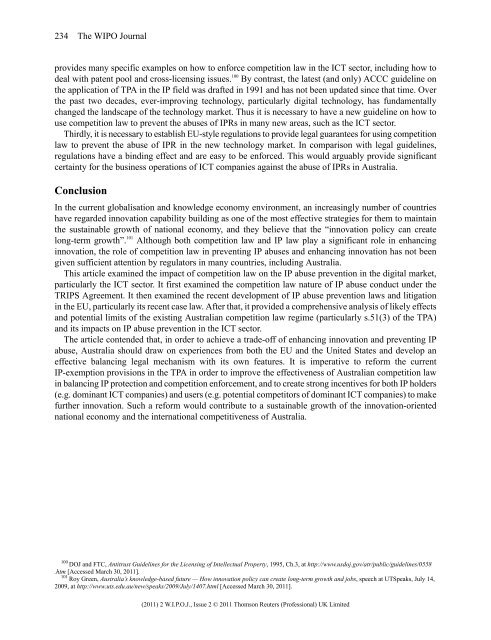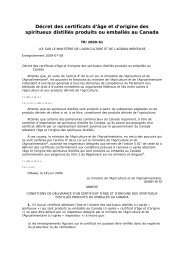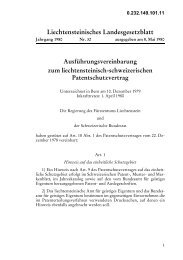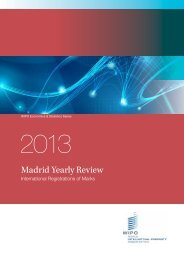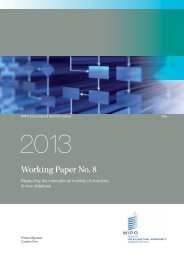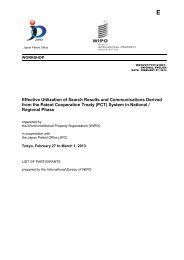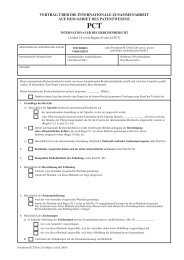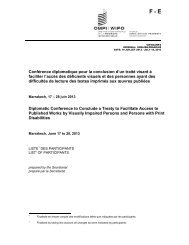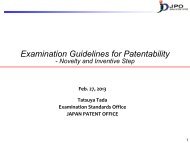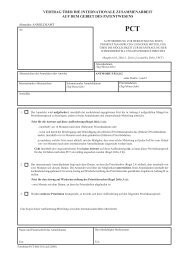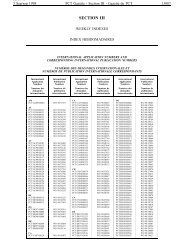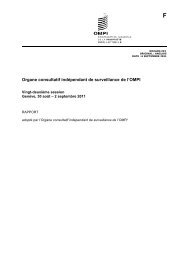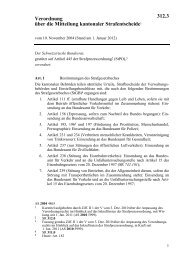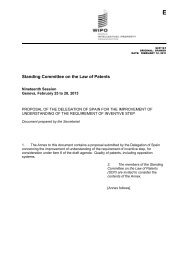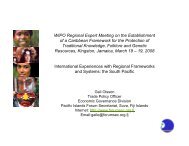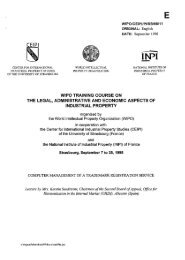WIPO Journal - World Intellectual Property Organization
WIPO Journal - World Intellectual Property Organization
WIPO Journal - World Intellectual Property Organization
You also want an ePaper? Increase the reach of your titles
YUMPU automatically turns print PDFs into web optimized ePapers that Google loves.
234 The <strong>WIPO</strong> <strong>Journal</strong><br />
provides many specific examples on how to enforce competition law in the ICT sector, including how to<br />
deal with patent pool and cross-licensing issues. 100 By contrast, the latest (and only) ACCC guideline on<br />
the application of TPA in the IP field was drafted in 1991 and has not been updated since that time. Over<br />
the past two decades, ever-improving technology, particularly digital technology, has fundamentally<br />
changed the landscape of the technology market. Thus it is necessary to have a new guideline on how to<br />
use competition law to prevent the abuses of IPRs in many new areas, such as the ICT sector.<br />
Thirdly, it is necessary to establish EU-style regulations to provide legal guarantees for using competition<br />
law to prevent the abuse of IPR in the new technology market. In comparison with legal guidelines,<br />
regulations have a binding effect and are easy to be enforced. This would arguably provide significant<br />
certainty for the business operations of ICT companies against the abuse of IPRs in Australia.<br />
Conclusion<br />
In the current globalisation and knowledge economy environment, an increasingly number of countries<br />
have regarded innovation capability building as one of the most effective strategies for them to maintain<br />
the sustainable growth of national economy, and they believe that the “innovation policy can create<br />
long-term growth”. 101 Although both competition law and IP law play a significant role in enhancing<br />
innovation, the role of competition law in preventing IP abuses and enhancing innovation has not been<br />
given sufficient attention by regulators in many countries, including Australia.<br />
This article examined the impact of competition law on the IP abuse prevention in the digital market,<br />
particularly the ICT sector. It first examined the competition law nature of IP abuse conduct under the<br />
TRIPS Agreement. It then examined the recent development of IP abuse prevention laws and litigation<br />
in the EU, particularly its recent case law. After that, it provided a comprehensive analysis of likely effects<br />
and potential limits of the existing Australian competition law regime (particularly s.51(3) of the TPA)<br />
and its impacts on IP abuse prevention in the ICT sector.<br />
The article contended that, in order to achieve a trade-off of enhancing innovation and preventing IP<br />
abuse, Australia should draw on experiences from both the EU and the United States and develop an<br />
effective balancing legal mechanism with its own features. It is imperative to reform the current<br />
IP-exemption provisions in the TPA in order to improve the effectiveness of Australian competition law<br />
in balancing IP protection and competition enforcement, and to create strong incentives for both IP holders<br />
(e.g. dominant ICT companies) and users (e.g. potential competitors of dominant ICT companies) to make<br />
further innovation. Such a reform would contribute to a sustainable growth of the innovation-oriented<br />
national economy and the international competitiveness of Australia.<br />
100<br />
DOJ and FTC, Antitrust Guidelines for the Licensing of <strong>Intellectual</strong> <strong>Property</strong>, 1995, Ch.3, at http://www.usdoj.gov/atr/public/guidelines/0558<br />
.htm [Accessed March 30, 2011].<br />
101<br />
Roy Green, Australia’s knowledge-based future — How innovation policy can create long-term growth and jobs, speech at UTSpeaks, July 14,<br />
2009, at http://www.uts.edu.au/new/speaks/2009/July/1407.html [Accessed March 30, 2011].<br />
(2011) 2 W.I.P.O.J., Issue 2 © 2011 Thomson Reuters (Professional) UK Limited


